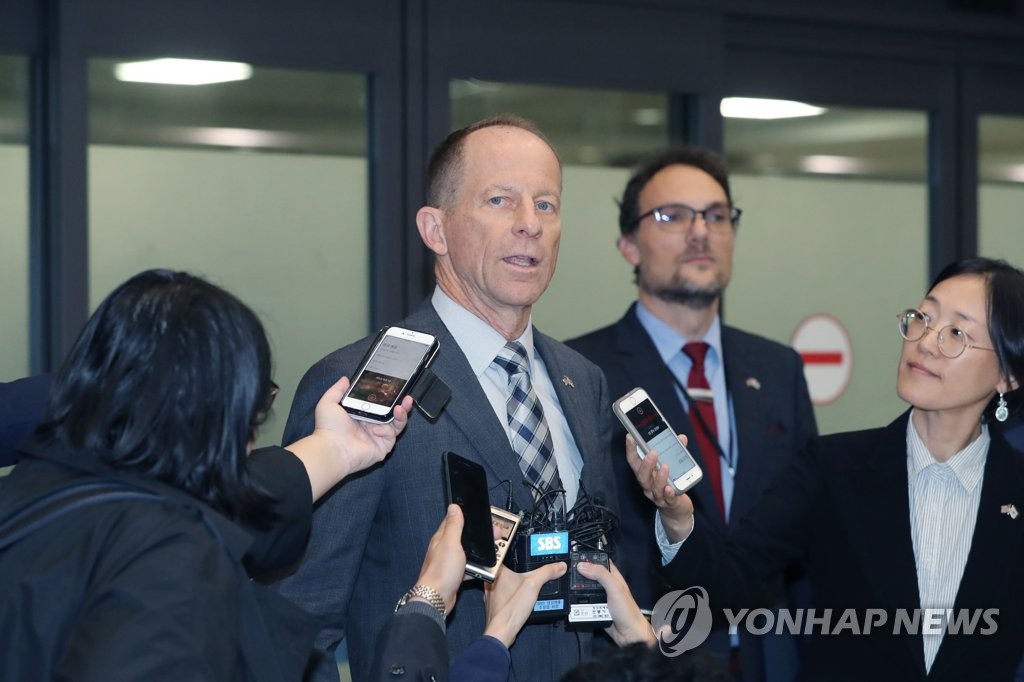- California Assembly OKs highest minimum wage in nation
- S. Korea unveils first graphic cigarette warnings
- US joins with South Korea, Japan in bid to deter North Korea
- LPGA golfer Chun In-gee finally back in action
- S. Korea won’t be top seed in final World Cup qualification round
- US men’s soccer misses 2nd straight Olympics
- US back on track in qualifying with 4-0 win over Guatemala
- High-intensity workout injuries spawn cottage industry
- CDC expands range of Zika mosquitoes into parts of Northeast
- Who knew? ‘The Walking Dead’ is helping families connect
Top U.S. diplomat for Asia visits Seoul amid GSOMIA tensions
The top U.S. diplomat for Asian affairs arrived in Seoul on Tuesday for talks with South Korean officials that are expected to focus on a soon-to-expire military intelligence-sharing pact between Seoul and Tokyo.
During his three-day stay, Assistant Secretary of State David Stilwell is scheduled to hold a series of meetings with senior officials here, including courtesy calls on Foreign Minister Kang Kyung-wha and First Vice Foreign Minister Cho Sei-young on Wednesday.
He is also expected to meet officials from the presidential office Cheong Wa Dae and defense ministry, such as Deputy Defense Minister Chung Suk-hwan.
Upon arrival, Stilwell said he expects to have “productive” meetings.
“I look forward to productive meetings with your government so we can reaffirm the alliance is the cornerstone of peace and security here in the region,” he told reporters at Incheon International Airport, west of Seoul.

“Following the war, the U.S. was a donor and Korea was obviously a recipient of the U.S. aid as it sought to rebuild itself. Now, Korea is a strong contributor in terms of development for the region and a great partner in that,” he said.
“So I look forward to meetings here tomorrow and I know they will be productive,” he added.
His visit comes ahead of the Nov. 22 deadline for Seoul to reverse its decision to terminate the General Security of Military Information Agreement (GSOMIA) with Tokyo, seen also as a platform for trilateral cooperation between the United States and its two Asian allies.
Seoul announced the decision in late August after Tokyo tightened export controls on goods vital to the South Korean tech industry and downgraded Seoul’s status as a trading partner, in apparent protest of South Korean court rulings against Japanese companies over wartime forced labor.
Washington has publicly expressed displeasure over the decision and called for retraction so as to maintain the three-way security coordination in the region.
Stilwell recently said economic issues should not spill over into the security field, calling for both sides “to find creative solutions.”
“We do of course encourage the (South) Korean side to return to this agreement, because it benefits us, benefits you, and it certainly benefits them as well,” he said in Tokyo on Oct. 26.
Seoul has made it clear that it won’t retract the decision unless Tokyo withdraws the economic retaliatory measures, asking for Washington to play a role in helping to resolve the row.
During his visit, the allies are also expected to explore ways to enhance cooperation in their regional policy initiatives — Seoul’s New Southern Policy and Washington’s Indo-Pacific Strategy.
The New Southern Policy aims to deepen ties with the Association of Southeast Asian Nations (ASEAN) and India. The Indo-Pacific Strategy seeks to keep the region free and open by preventing attempts at blocking the global commons, such as freedom of navigation.
Joint efforts to find common ground between the initiatives are expected to be high on the agenda for the allies’ Senior Economic Dialogue set to take place in Seoul on Wednesday.
Stilwell could also discuss other pending issues, including nuclear talks with North Korea and ongoing negotiations between the allies over the sharing of the cost for stationing American troops here.
His trip to Seoul is the second to last leg of his trip to Asia, which has included stops to Japan, Myanmar, Malaysia and Thailand. He will travel to Beijing on Thursday.











